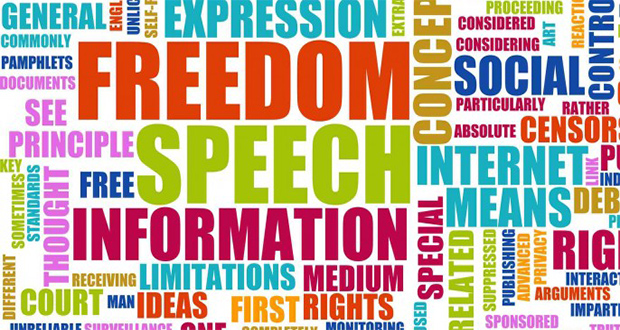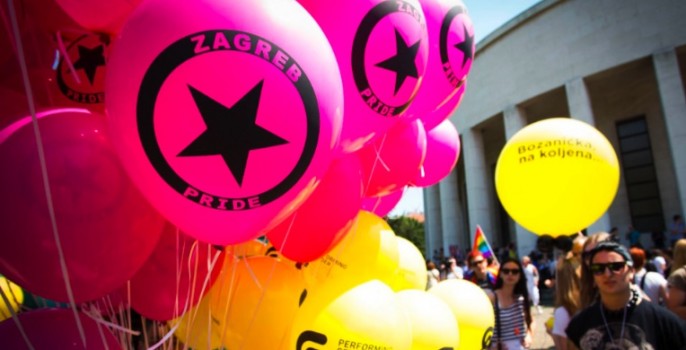The issue of Freedom of Expression for sexual and gender minorities was chosen by activists worldwide as a priority area of concern that deserves our full attention on the upcoming International Day Against Homophobia and Transphobia, May 17, 2014 ! Here will find arguments and ideas for action, as well links to further resources. We will be updating this page in the coming weeks with new material including quotes, statistics and images designed for online sharing.
NEW – Download the full info & campaigning toolkit on Freedom of Expression !
Arguments for Action
The right to freedom of expression of members of sexual and gender minorities should be universally respected as part of the most fundamental human rights, as is enshrined in Article 19 of the Universal Declaration of Human Rights.
Yet, in the 78 countries in the world where same sex relationships are criminalized, any positive expression on the issue of sexual identity is censored, putting an initial barrier to the possibility of advocating for change, or to start addressing the stigma that sexual and gender minorities face. In many additional countries, freedom of expression around sexual orientation and gender identity issues is heavily restricted by abusive laws which equate information about sexual and gender diversity to pornography, or deem them intrinsically harmful to children and/or offensive to society at large.
Our analysis reveals that at least 70% of the world population live in contexts where their freedom of expression on issues related to sexual orientation and gender identity is systematically being violated.
This includes either countries where same sex relationships are outright illegal, or those like Russia which explicitly restrict freedom of expression on sexual orientation and gender identity issues, and also those which use other laws, like pornography or public morality laws, to systematically censor information related to sexual orientation and gender identity (as in China and Turkey, for example).
Worrying trends
The Russian Federation has indeed recently provided the most notorious case of violation of freedom of expression for sexual and gender minorities through the banning of so-called ‘homosexual propaganda’ towards children, which actually results in the prohibition of any public discourse about sexual orientation and gender identity or expression; a case which has sparked international outrage.
But this cloaking of repression in the language of children’s rights and public morality has also become a very popular tactic for conservative constituencies in contexts where the direct and total criminalization of same sex relationships is not an easy political option, which is the case in many of the Council of Europe countries and in much of Latin America. Bills were tabled recently in Ukraine, Costa Rica, Hungary, Lithuania and Latvia (and discussed by authorities in Armenia and Kyrgyzstan), and while largely unsuccessful for now, this trend casts a shadow over the future. Many organizations working with sexual and gender minorities are fearing that restrictions on Freedom of Expression and information will constitute their upcoming battleground.
The right to freedom of gender expression universally violated
In almost NO country in the world can trans people freely express their true gender identity without having to face extreme violations of their human rights. Progressive legislation, guaranteeing people’s rights to self-determine their gender identities and expressions, lags far behind sexual orientation focused legal progress in all world regions.
In Europe, for example, 16 countries deny trans people the rights to change their name and gender on official documents. And 23 of the 33 countries which do allow it, require forced sterilization as a pre-requisite for such changes. 19 countries require divorce. In all too many cases, doctors and psychiatrists remain the final decision-makers on how trans people will be allowed to access their rights.
Less than a handful of governments worldwide have legal provisions in place for non-binary identifying individuals to have their gender expressions formally recognised. Amazingly, Nepal, Bangladesh and Pakistan provide recognition of ‘third gender’ on national identification papers. The rest of the world, including Europe, lags far behind and only a handful of national medical authorities do NOT categorise trans or gender non-confirming identities in terms of mental health conditions.
Where LGBT people are censored, all people are deprived of their freedom of expression
The censorship of sexual and gender minorities issues acts as a powerful indicator of the general level of respect of human rights. Not surprisingly, the heaviest crackdowns on sexual and gender minorities come from contexts where there is equal pressure on advocates for democracy, right to freedom of religion or belief, women’s rights, minority groups rights, etc.
Repeatedly, as in recent developments in Turkey and Armenia, gender equality measures are being cast – and effectively smeared – as enabling the promotion of homosexuality, attacks on traditional values, and the breakdown of established families. Where LGBT people are censored, all people are deprived of diverse and important viewpoints.
Defending freedom of expression of sexual and gender minorities is therefore not only to defend particularly vulnerable groups of people, it is also a strategic move; to stand in solidarity at the forefront, often referred to as the ‘last frontier’, of the defence of human rights. It is therefore a concern to all human rights organisations campaigning for freedom of expression rights for all people.
For the International Day Against Homophobia & Transphobia, May 17 2014, thousands of people will stand together in hundreds of actions around the world, to fight for a world where LGBT people – and everyone – have the right to freedom of expression !
Take Action !
- Join the IDAHOT Creative Protest working group on facebook, where over 500 activists from around the world are already discussing their protest plans for May 17 2014. It’s an informal space for for networking, ideas sharing, planning and IDAHOT events posting in the lead up to the Day, and beyond. Come and join us !
- Join the May 17 movement by Creating a ‘Free Expression Zone’ in your town or city. Find out more here !
- See specific Ideas for Action 2014 here !
- IDAHOT Freedom of Expression: policy discussion space. For activists who are planning advocacy activities around Freedom of Expression for the International Day Against Homophobia and Transphobia 2014, we’ve also set up a policy discussion group, where activists can exchange strategic information on this specific angle. If you have specific expertise or just an interest in this theme, please come and join us here.
- For ideas for advocacy actions, download the full IDAHOT info & campaigning toolkit here.
- If you would like to be involved – as a partner organisation, as a group taking action, or as a volunteer – please drop us a line at contact@dayagainsthomophobia.org
We would love to hear from you !


